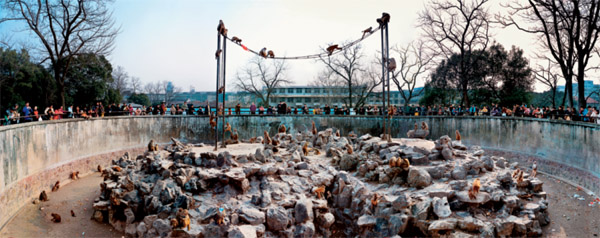 |
|
| China Reach An exhibition of new photography and video from China is ambitious in scale, experimental in nature, individual in outlook—and rooted in a changing culture. The young woman in the U of C sweatshirt gasped as she caught sight of Feng Feng’s Shin Brace (1999–2000): “Omigod.” The Brobdingnagian-sized bodyscape—a metal apparatus drilled into the leg of a Chinese workman, who wore it for 18 months—filled an entire wall of the Smart Museum, where Between Past and Future: New Photography and Video from China opened September 16.
Feng Feng’s photograph is not the only larger-than-life aspect of the mammoth exhibition, presented jointly at the Smart and the Museum of Contemporary Art Chicago (MCA). Exhibition curators Wu Hung, the Harrie H. Vanderstappen distinguished service professor of art history, and Christopher Phillips, curator at the International Center of Photography in New York, divided the 130 works by 60 artists into four themes: “History and Memory” and “Reimagining the Body” are at the Smart, and “People and Place” and “Performing the Self” are at the MCA. The October 2–January 16 exhibition includes a series of special events, kicked off by a two-day scholarly symposium exploring the ongoing cross-fertilization among experimental Chinese photography, video, and film. Many of the photographs and videos on display had never been seen in the United States—and rarely in mainland China. Indeed, as he led reception-goers through the Smart on a tour of the 13 artists represented in “Reimagining the Body,” Wu, dapper in shades of brown and black, confessed, “I sometimes feel a bit uneasy to see these works in this environment because I first saw them in a Shanghai warehouse,” exhibited in unofficial shows, “underground.” Now that underground status has shifted, as the preface to the accompanying catalog notes: “Whereas Chinese artists often had no choice but to work in relative isolation during the 1980s and early 1990s, over the past decade this situation has completely reversed. Chinese artists are everywhere, and new art from China is some of the freshest, most engaged and engaging work one can find anywhere.“ After Chicago the exhibition, which opened in New York this summer at the International Center of Photography and the Asia Society, will travel to the Seattle Art Museum (February 10–May 15, 2005), London’s Victoria and Albert Museum (September 2005–January 2006), Berlin’s Haus der Kulturen der Welt (March–May 2006), and the Santa Barbara Museum of Art (Summer 2006).—M.R.Y. |
|
phone: 773/702-2163 | fax: 773/702-8836 | uchicago-magazine@uchicago.edu

